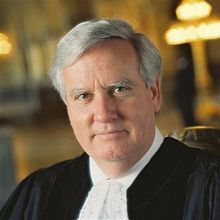Christopher Greenwood
Sir Christopher John Greenwood , GBE CMG QC (born May 12, 1955 in Wellingborough ) is a British lawyer and professor of international law at the London School of Economics and Political Science . On November 6, 2008, he was elected judge at the International Court of Justice (ICJ) in The Hague for nine years .
Life
Greenwood attended Wellingborough School in Wellingborough and then studied law at Magdalene College of Cambridge University where he received his 1976 Bachelor graduated, in 1977 a Bachelor of Laws earned a master's degree in international law and the 1980th
From 1981 to 1996 he lectured at the University of Cambridge and was subsequently appointed Professor of International Law at the London School of Economics and Political Science.
He has been a barrister since 1985 . He was appointed Crown Attorney in 1999 and was accepted into the Order of St. Michael and St. George in June 2002 . In 2002, he wrote a controversial opinion for Attorney General Goldsmith and the British government justifying the Iraq invasion .
Greenwood is also Associate Editor of the British Year Book of International Law , the Year Book of International Humanitarian Law, and the Journal of Conflict and Security Law . He is a member of the British Institute of International and Comparative Law, the International Institute for Humanitarian Law and, since 1979, the American Society for International Law .
He has represented the UK Government on numerous international and national courts.
On November 6, 2008, Greenwood was appointed to the International Court of Justice to succeed Rosalyn Higgins . His candidacy for a further term as an ICJ judge was withdrawn in 2017 after unsuccessful election rounds in the UN General Assembly in favor of the Indian lawyer Dalveer Bhandari .
Work (selection)
- State responsibility for the decisions of national courts . In: Malgosia Fitzmaurice (ed.): Issues of state responsibility before international judicial institutions , Hart, Oxford 2004, ISBN 1-8411-3389-2 , pp. 55-73
- Command responsibility and the Hadzihasanović decision . In: Journal of international criminal justice , Vol. 2, 2004, ISSN 1478-1387 , pp. 598-605
- The legality of the use of force: Iraq in 2003 . In: Michael Bothe (ed.): Redefining sovereignty: the use of force after the cold war , Transnational Publ., Ardsley 2005, ISBN 1-571-05324-7 , pp. 387-415
- Essays on was in international law . Cameron May, London 2006, ISBN 978-1-905017-32-4
Individual evidence
- ↑ www.icj-cij.org/presscom/files/3/14863.pdf ( Memento of the original from June 7, 2013 in the Internet Archive ) Info: The archive link was inserted automatically and has not yet been checked. Please check the original and archive link according to the instructions and then remove this notice. As of November 21, 2008.
- ↑ a b Owen Bowcott Legal affairs correspondent: No British judge on world court for first time in its 71-year history . In: The Guardian . November 20, 2017, ISSN 0261-3077 ( theguardian.com [accessed December 20, 2017]).
- ↑ Owen Bowcott: Was QC sticks to his guns . In: The Guardian . March 1, 2004, ISSN 0261-3077 ( theguardian.com [accessed December 20, 2017]).
- ^ The Committee Office, House of Commons: Memorandum by Professor Christopher Greenwood, CMG, QC THE LEGALITY OF USING FORCE AGAINST IRAQ. In: House of Commons - Foreign Affairs - Minutes of Evidence. Retrieved December 20, 2017 .
Web links
- International Court of Justice - Judge Christopher Greenwood biography on the ICJ website (English, with picture)
- Biography with images on the side of Essex Court Chambers (English)
- Biography on the side of the LSE (English)
- Greenwood Memorandum on the Legality of Use of Force against Iraq (October 2002 )
| personal data | |
|---|---|
| SURNAME | Greenwood, Christopher |
| ALTERNATIVE NAMES | Greenwood, Christopher John (full name) |
| BRIEF DESCRIPTION | British jurist and judge at the International Court of Justice in The Hague |
| DATE OF BIRTH | May 12, 1955 |
| PLACE OF BIRTH | Wellingborough |
